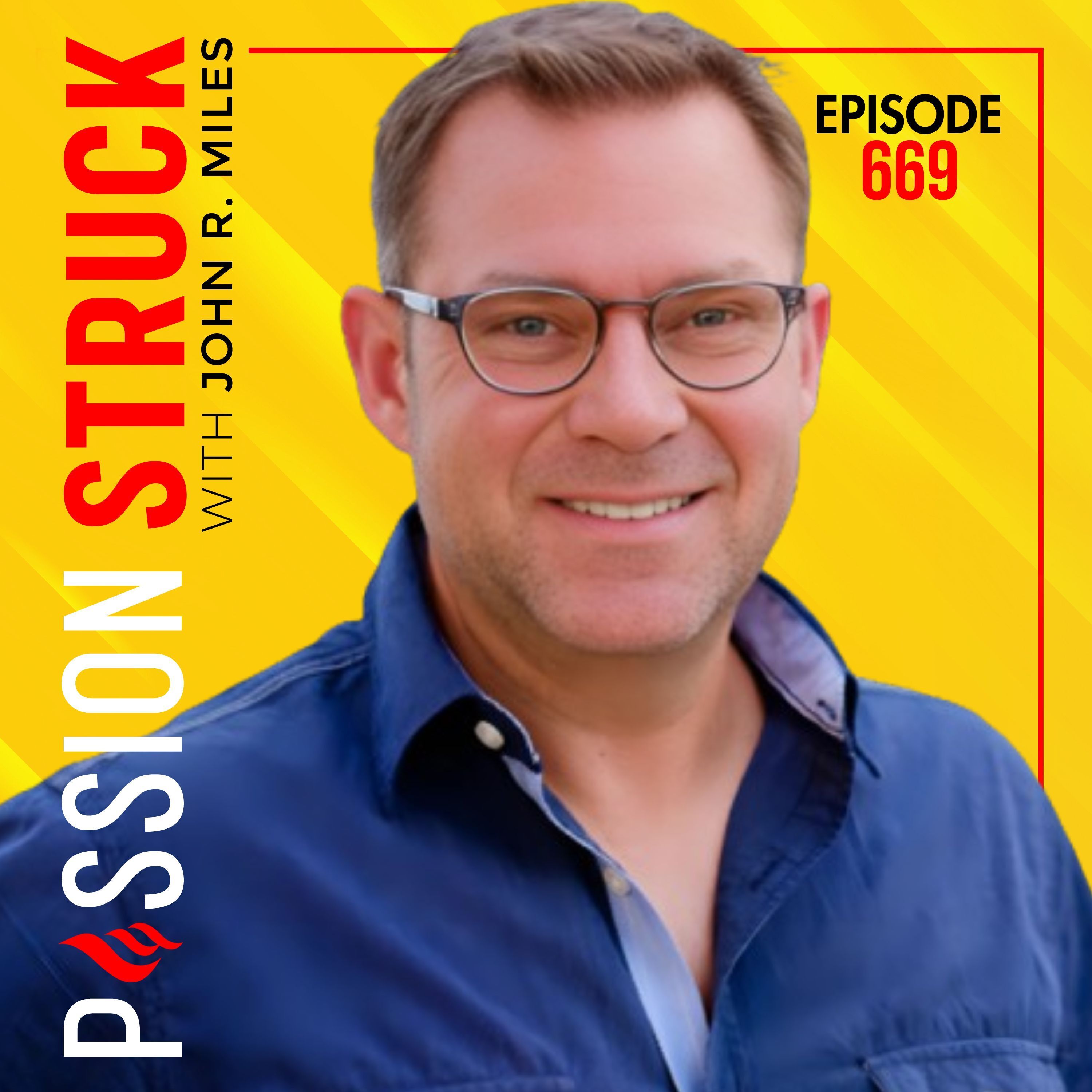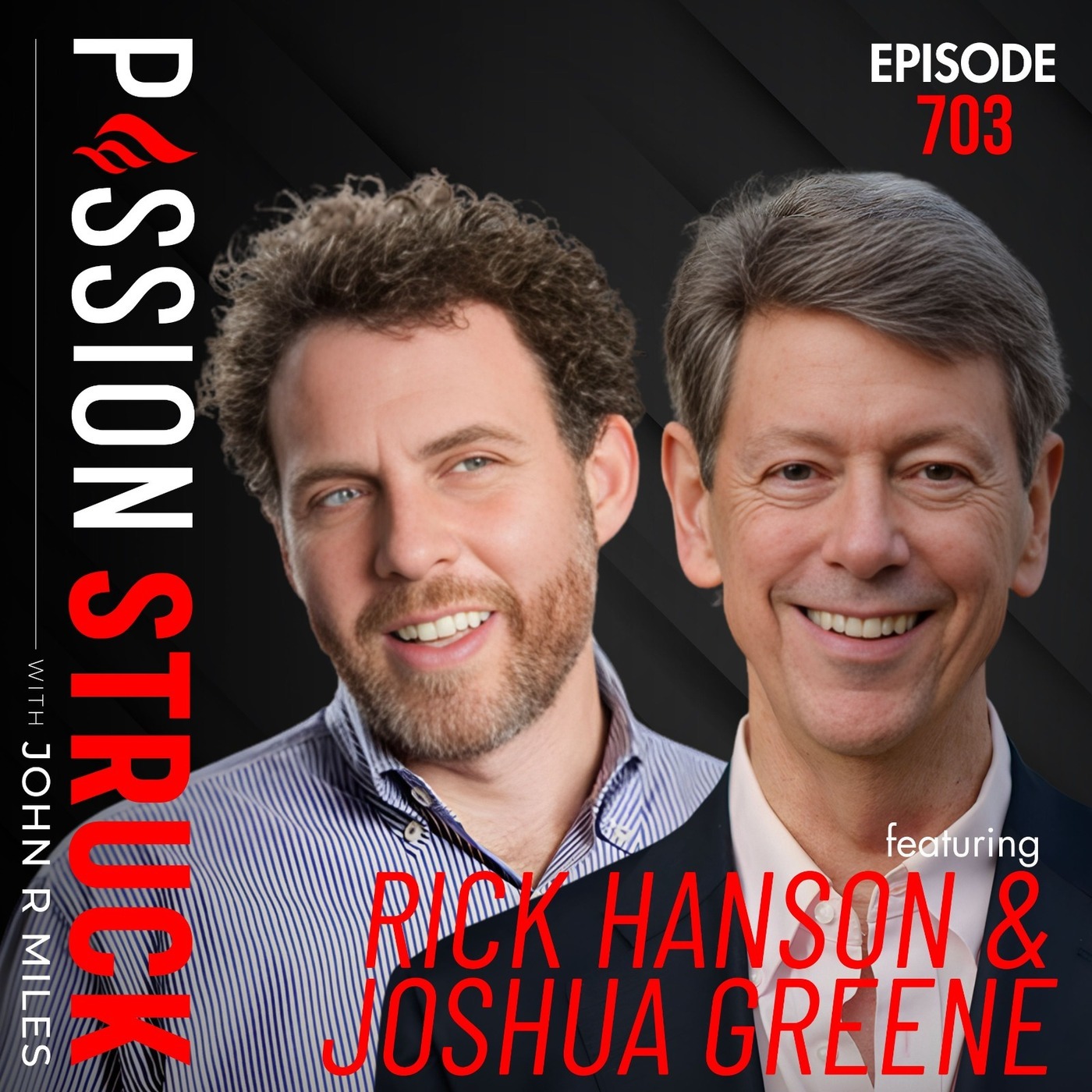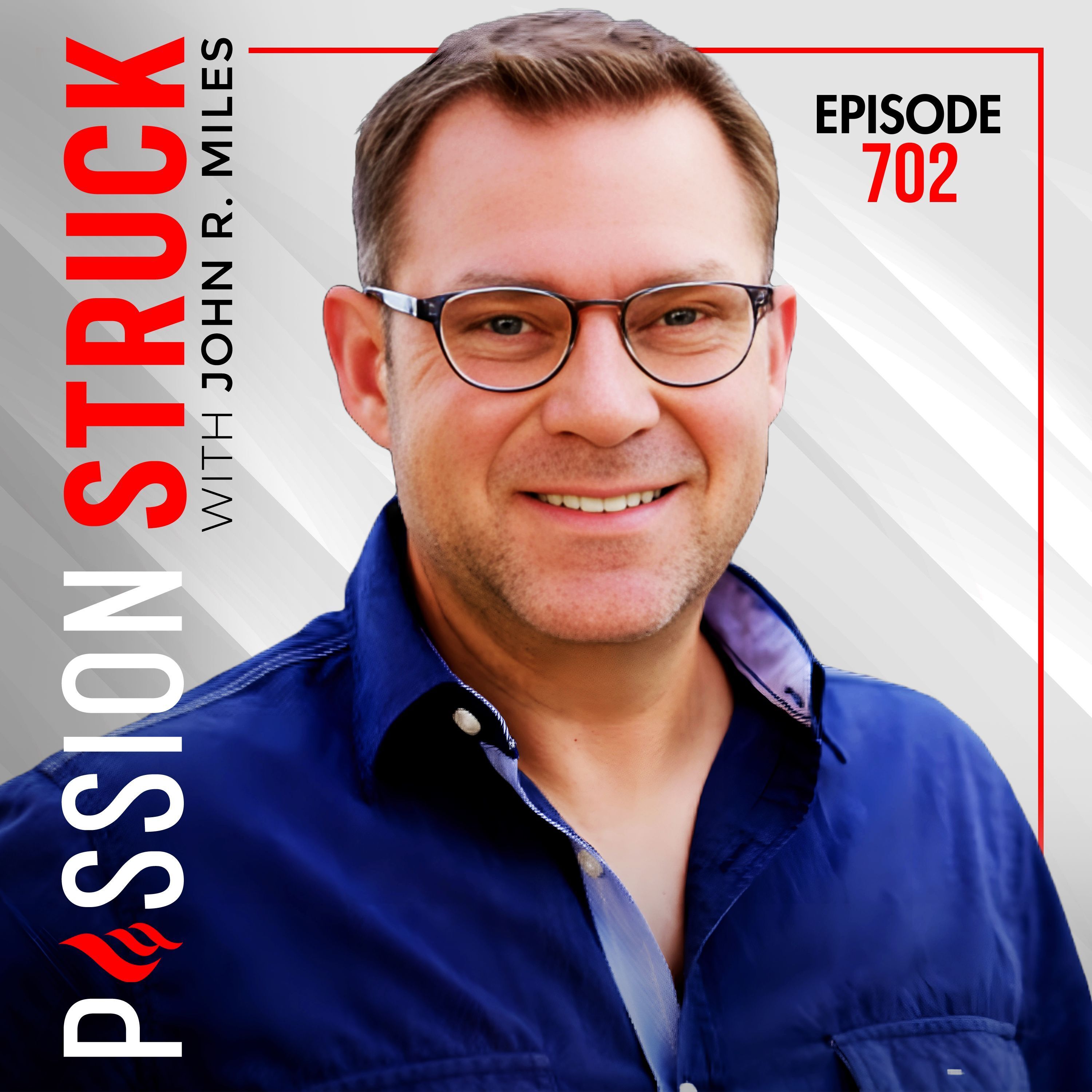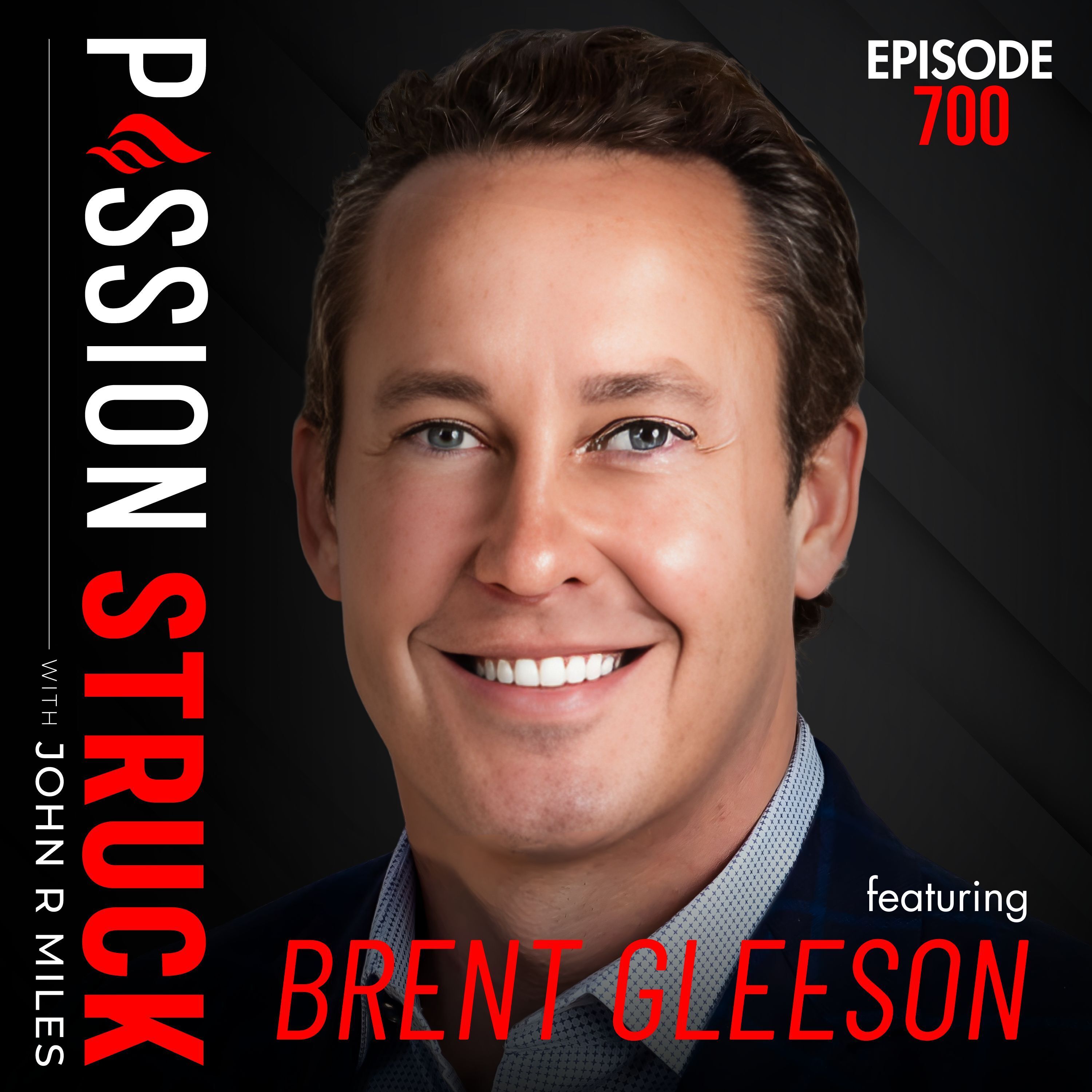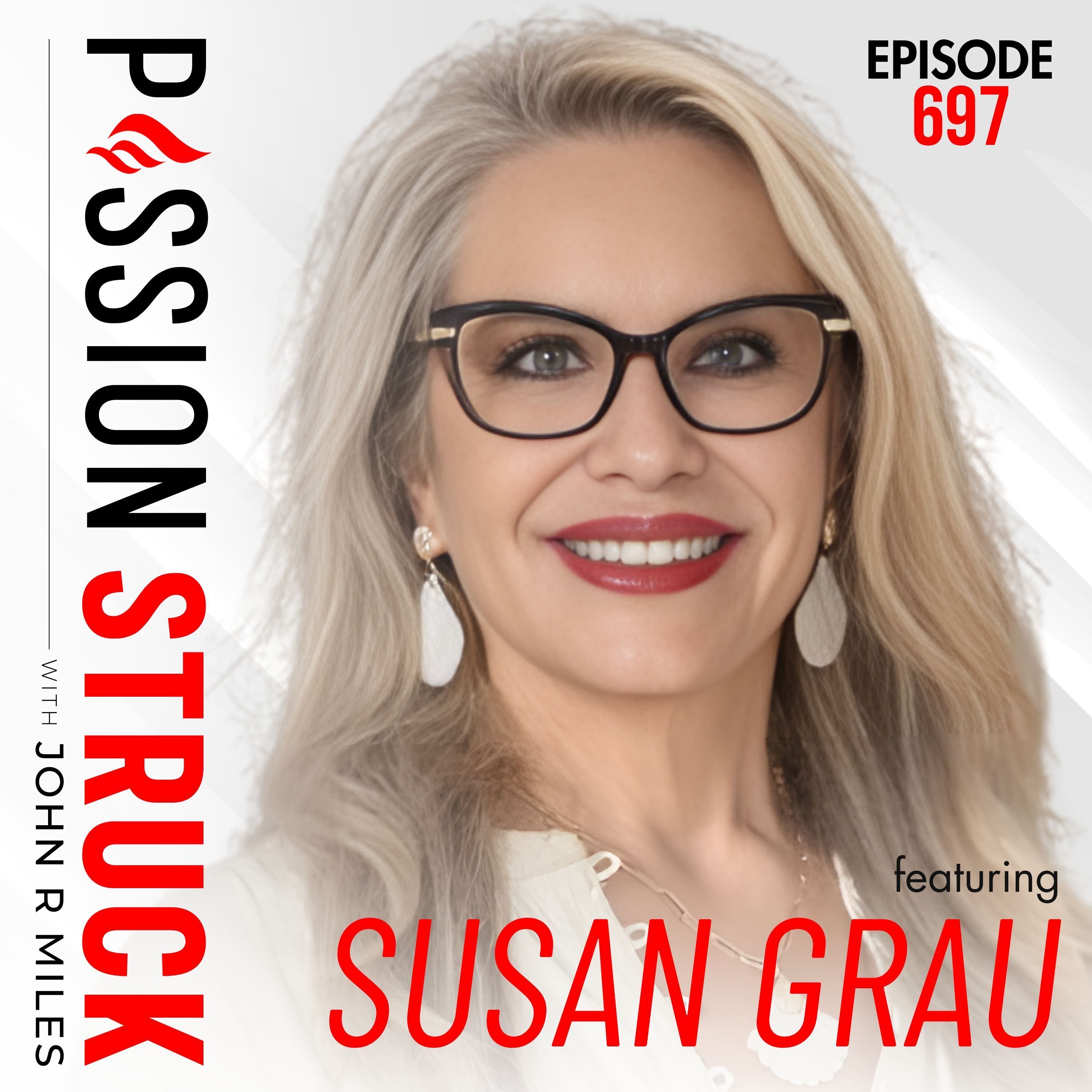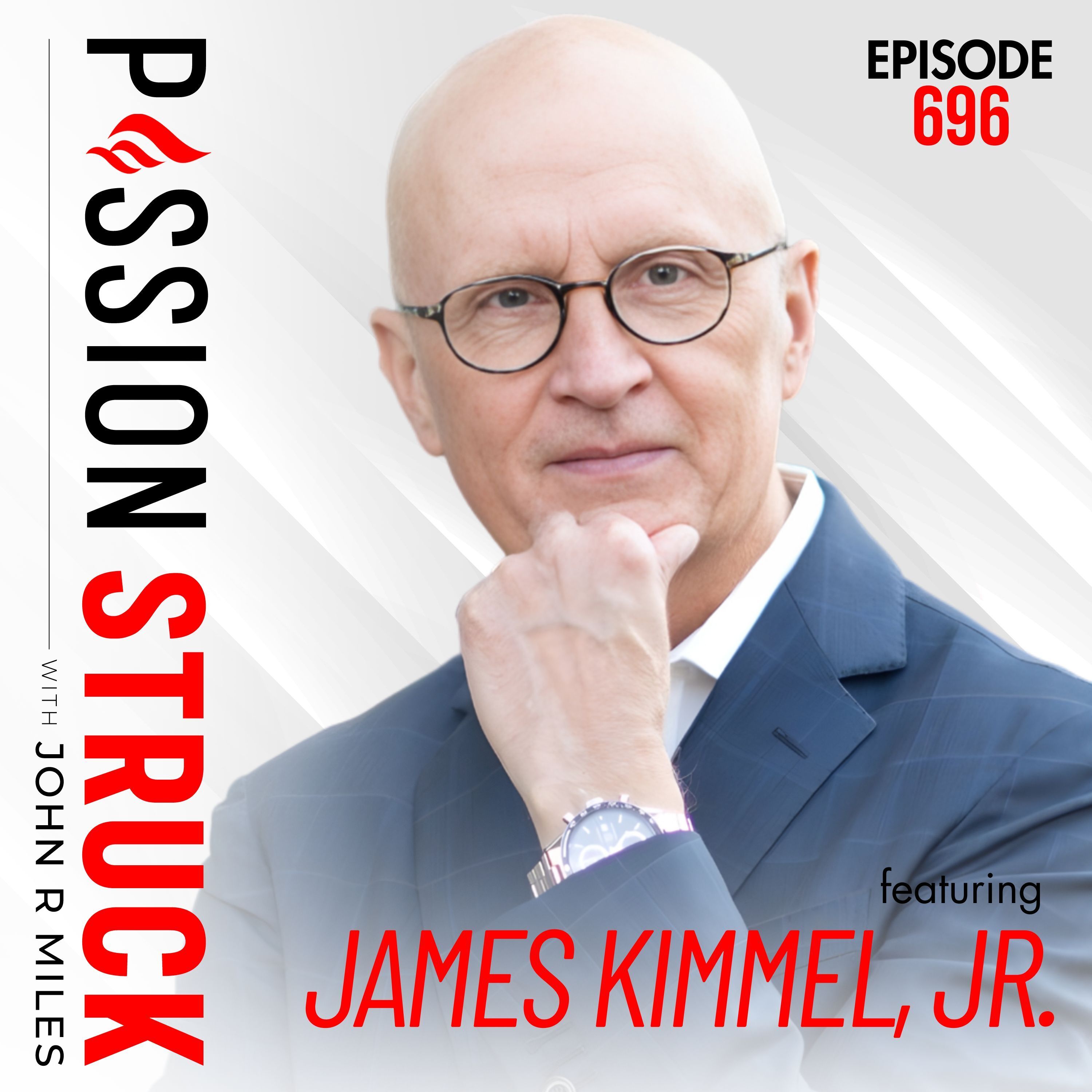BELONGING: The Secret to a Life of Deep Impact and Connection | EP 668
Most of us spend much of our lives trying to fit in, smoothing our edges, editing our quirks, and becoming who the world wants us to be. But fitting in isn’t the same as belonging.
Belonging is about coming home to yourself and then building spaces where others can do the same. It’s about creating deep connection and living a life that feels both meaningful and aligned.
In episode 669 of Passion Struck, John tackles the question of how to build belonging using a simple, yet powerful framework he developed called BELONG — six choices that help you reclaim your identity, stop performing for approval, and create a life of purpose.
Go Deeper: The Ignited Life Substack
If this episode stirred something in you, The Ignited Life is where the transformation continues. Each week, John shares behind-the-scenes insights, deeper dives into the episodes, workbooks, science-backed tools, and personal reflections to help you turn intention into action.
Get the full companion workbook at TheIgnitedLife.net
Full episode on YouTube: https://www.youtube.com/@JohnRMiles
Listen on Apple Podcasts, Spotify, or wherever you get your podcasts
Everyone deserves to feel valued and important. Show it by wearing it: https://startmattering.com/
See Privacy Policy at https://art19.com/privacy and California Privacy Notice at https://art19.com/privacy#do-not-sell-my-info.
Press play and read along
Transcript
Speaker 1 With markets changing and living costs rising, finding a reliable place to grow your money matters now more than ever.
Speaker 1 With the WealthFront cash account, your uninvested money earns a 3.75% APY, which is higher than the average savings rate.
Speaker 1 There are no account fees or minimums, and you also get free instant withdrawals to eligible accounts 24-7. So you always have access to your money when you need it.
Speaker 1 And when you're ready to invest, you can transfer your cash to one of WealthFront's expert-built portfolios in just minutes.
Speaker 1 More than 1 million people already use Wealthfront to save and build long-term wealth with confidence. Get started today at WealthFront.com.
Speaker 1 Cash account offered by Wealthfront Brokerage LLC, member FINRA SIPC. Wealthfront Brokerage is not a bank.
Speaker 1 Annual percentage yield on deposits as of September 26, 2025 is representative, subject to change, and requires no minimum. The cash account is not a bank account.
Speaker 1 Funds are swept to program banks where they earn the variable APY.
Speaker 2 Coming up next on Passion Struck, the greatest crisis in the world today might not be disconnection, but dislocation from our truest selves.
Speaker 2 We spend so much of our lives trying to fit in, smoothing our edges, editing our quirks, pretending to be who the world wants us to be. But belonging isn't the same as blending.
Speaker 2
Belonging isn't about erasing yourself to feel accepted. It's about coming home to who you truly are and inviting others to do the same.
And when we get belonging wrong, we don't just lose connection.
Speaker 2
We lose ourselves. Today, we're going to explore how to find our way back.
Not by waiting for permission, but by building belonging one choice at a time. Welcome to Passion Struck.
Speaker 2 I'm your host, John Miles. This is the show where we explore the art of human flourishing and what it truly means to live like it matters.
Speaker 2 Each week, I sit down with change makers, creators, scientists, and everyday heroes to decode the human experience and uncover the tools that help us lead with meaning, heal what hurts, and pursue the fullest expression of who we're capable of becoming.
Speaker 2 Whether you're designing your future, developing as a leader, or seeking deeper alignment in your life, This show is your invitation to grow with purpose and act with intention.
Speaker 2 Because the secret to a life of deep purpose, connection, and impact is choosing to live like you matter. Welcome to episode 669 of Passion Struck and week four of our Decoding Humanities series.
Speaker 2 To all of you who come back week after week, thank you. Your support has helped build not just a podcast, but a mattering revolution.
Speaker 2 If this show has helped you live more intentionally or lead more authentically, I'd love your help in two quick ways. First, share this episode with someone who needs it.
Speaker 2
A colleague, a student, a friend. Word of mouth is how this message spreads.
Second, leave a five-star rating or review on Apple Podcasts or Spotify.
Speaker 2 It takes less than 30 seconds, but it's one of the most powerful ways to help new listeners find the show. Over the past few weeks, we've been on a journey together.
Speaker 2 A journey to decode what it means to be human.
Speaker 2 I began this series by decoding our human operating system, examining how we're wired, and introducing the concept of code as a guide to living in alignment.
Speaker 2 Then we explored invisible trauma and hidden healing, uncovering the heal principles that help us process pain and reclaim wholeness.
Speaker 2 Last week we turned to legacy and choice, what it means to live by design rather than by default, and I walked you through choice, a practical way to build a life you don't need to escape from.
Speaker 2 If you missed any of those episodes, you can find the full series on our Decoding Humanity playlist on Spotify and the full deep dives and companion guides at theignitedlife.net, all designed to help you not just listen, but to take action.
Speaker 2 This week, we've been exploring the theme of identity and belonging.
Speaker 2 On Tuesday, journalist Olga Kazan joined us to unpack how outsiders can transform their differences into superpowers and why true belonging means no longer editing yourself for approval.
Speaker 2 On Thursday, Robert Glazier explained why quiet misalignment with your core values leads to burnout and how realignment creates freedom, clarity, and purpose.
Speaker 2 Today, I want to bring those threads together because belonging isn't just about being accepted by others. It's about refusing to abandon yourself.
Speaker 2 In this solo, I'll share a practical framework to help you build belonging. One that can guide your identity, strengthen your relationships, and deepen your sense of purpose.
Speaker 2 Because the secret to a life of deep connection isn't waiting for someone to hand you a seat at the table.
Speaker 2 It's building the table, plank by plank, choice by choice, and inviting others to sit with you. Now, let's get into the solo.
Speaker 2 Thank you for choosing Passion Struck and choosing me to be your host and guide on your journey to creating an intentional life. Now, let that journey begin.
Speaker 4 A BetterHelp ad.
Speaker 4 Lewis Gapaldi partnered with BetterHelp to get word out about how important therapy can be.
Speaker 5 I struggle most weeks to like get up and get myself up and ready and go to therapy or whatever, like even like open the laptop to talk to.
Speaker 5 My therapist sometimes can be really difficult, but I do it because I realize how important it is for me to continue to feel good. Like I felt the best I've felt in a long time through therapy.
Speaker 4 Learn more about online therapy at betterhelp.com.
Speaker 3
There's a reason. Who am I and where do I fit? Are two of the oldest questions in human history.
From the moment we're born, we're scanning for cues. Do I belong here? Am I safe here?
Speaker 3
Who do I have to be to be accepted? And yet, somewhere along the way, those questions get quieter. Not because they get answered, but because we learn to mask them.
We tell ourselves we're fine.
Speaker 3
We bury the doubt under resumes, promotions, and perfectly curated social profiles. But inside, the question of belonging never really goes away.
It just hides.
Speaker 3 That's why I was so struck by my conversation in episode 593 with Stanford professor Greg Walton.
Speaker 3 In one of Walton's landmark studies, he asked seventh graders to write about their transition to middle school, what they had worried about, what had been so hard, and what eventually helped them feel like they belonged.
Speaker 3 Most of the kids ended up saying the same exact thing. At first, I didn't feel like I fit in, but over time, I realized I did.
Speaker 3
Then they shared those stories with a group of incoming sixth graders who were just starting school. The results were stunning.
The kids who heard the stories didn't feel better for just a day.
Speaker 3 They got in less trouble, had fewer conflicts with teachers, and were more likely to graduate on time seven years later.
Speaker 3 A 30-minute exercise shifted their sense of belonging so profoundly that it changed the trajectory of their education. This is the quiet revolution Greg Walton's research reveals.
Speaker 3 When we change what people believe about their place in the world, we change how they show up in it. And that's where this conversation about identity has to begin.
Speaker 3 Because if belonging can redirect the course of a child's life, what does it mean for the rest of us? What Walton's research shows is that belonging isn't just a feeling. It's actually a filter.
Speaker 3
Change the filter. and you change the meaning of every experience that follows.
That's not just true for sixth graders. It's true for all of us.
And here's the hard part.
Speaker 3 Most of us are running on filters we didn't even choose. Our lives are quietly shaped by what sociologists call social scripts.
Speaker 3
The unspoken rules about what success looks like, who we're supposed to be, and how we're supposed to act. Get the degree.
Land the job. Buy the house.
Hit the next milestone.
Speaker 3
And for a while, it it works. Until one day, the quiet question surfaces.
Is this really my life?
Speaker 3
In our conversation yesterday, Robert Glasier put words to this feeling when he said, quiet misalignment leads to burnout. Real alignment leads to peace.
Burnout, in his view, isn't just overwork.
Speaker 3 It's about living too far away from yourself. The emails, the deadlines, the endless striving feel unbearable.
Speaker 3 Not just because they're heavy, but because they're in service of something that doesn't match who you really are. I know this because I've experienced it firsthand.
Speaker 3 Years ago, I was leading a billion-dollar redesign of Dell's Complete Sales Operations, a program my predecessor had set in motion before becoming president to one of Dell's largest divisions.
Speaker 3 The project was anchored to an Oracle solution that given where the company was headed simply wouldn't meet our future needs. I saw the gap, but seeing it wasn't enough.
Speaker 3 Acting on it meant challenging a sitting president, questioning more than $300 million of investment, and reopening painful memories of Dell's failed SAP implementation, a billion-dollar plus failure no one wanted to repeat.
Speaker 3
I assembled a small cross-functional team to investigate, and our findings confirmed my fears. We were building the wrong future.
And that's where the real test began.
Speaker 3 Do I stay quiet to protect my career? Or do I take this up the chain knowing full well it could derail me, alienate senior executive leadership, and possibly cost me my career?
Speaker 3
I remember sitting down one-on-one with Michael Dell. He told me something that still echoes in my mind.
He said, John, sometimes being right means being alone. I chose to speak up.
It wasn't easy.
Speaker 3
It certainly wasn't safe. But it was the first time in years I felt fully aligned to who I was, and more importantly, what I stood for.
That's the paradox. Alignment often comes at a cost.
Speaker 3 Until your choices line up with your values, every other kind of belonging will feel hollow.
Speaker 3
We have to reclaim identity, and that starts with understanding the key difference between fitting in and truly belonging. Here's the trap we all fall into.
We confuse belonging with blending in.
Speaker 3
On the surface, they can look the same. You're accepted.
You're part of the group. You play by the rules.
But there's a hidden cost. To blend in, you have to round off your edges.
Speaker 3
Silence certain opinions. Mask certain traits.
Hide the parts of yourself that might not fit in. And over time, you start to disappear.
Speaker 3 Olga Kazan, my guest earlier this week in episode 667, has spent years studying this phenomenon.
Speaker 3 In her reporting for The Atlantic, she found to feel like you belong is to stop editing yourself for approval.
Speaker 3 That line hit me because I know exactly what it feels like to perform an identity instead of living it. I can remember seasons in my life where I was constantly calibrating.
Speaker 3 How should I act in this room? How much of myself is safe to show? I'd walk into executive meetings and leave my real opinions at the door.
Speaker 3 Not because I didn't have them, but because I thought they might cost me influence. And every time I did that, I felt a little further away from myself.
Speaker 3
This is what researchers refer to as identity suppression. It's the psychological tax.
of contorting yourself just to keep access to the room. And the paradox is this.
Speaker 3 The more we twist ourselves to be accepted, the less we actually feel like we belong. Because belonging, true belonging, requires being seen for who we really are.
Speaker 3
Which brings us to the real challenge. Belonging isn't something we wait to be passively given.
It's something that we actively have to build. First, in ourselves, then in the spaces we inhabit.
Speaker 3 And that's where I started to ask myself a bigger question. What is the secret to a life of deep connection and purpose?
Speaker 3 Why do some people seem to create relationships and communities where they flourish, where they feel fully seen and supported, while so many of us, despite being more connected than ever, still feel unseen, unknown, and on the outside looking in?
Speaker 3 What are the hidden elements that quietly erode belonging? What are the habits, beliefs, and scripts that keep us editing ourselves, burning out, or numbing out, and how do we reclaim them?
Speaker 3 Over the past few years, I've had the privilege of interviewing hundreds of the world's leading thinkers.
Speaker 3 Lori Santos, Rick Hansen, Lisa Miller, Sharon Salzberg, Young Pueblo, Susan Kane, Dan Pink, Katie Milkman, Dan Heath, Charles Duhig, Seth Godin, Angela Duckworth, Ethan Cross, Jamil Zaki, Gordon Flett, and many, many others.
Speaker 3 Each conversation felt like a puzzle piece, a clue not to just human psychology, but to something deeper, what it means to live in alignment with our souls.
Speaker 3 And slowly, those pieces began to form a picture. Not a single answer, but a pattern.
Speaker 3 A set of forces that appeared whenever anyone described a breakthrough moment of belonging, a time where they went from feeling invisible to feeling fully seen. And then it hit me.
Speaker 3
All those conversations, all the research, all the moments I had wrestled with this in my own life. They weren't just random.
They were pointing to something bigger.
Speaker 3 A pattern kept emerging, not once, but over and over again.
Speaker 3 Whether I was talking to Lisa Miller about spiritual awakening, Andrew Newberg about rewiring the brain for connection, Amy Edmondson about psychological safety, or Ellison Woodbrooks about the science behind great communication, the same six forces showed up.
Speaker 3 It was like finding six threads woven through every story of flourishing, every breakthrough moment of belonging, every time someone stopped hiding and started living with alignment with who they really are.
Speaker 3 So I gave those threads a name, belong. And let me tell you, they aren't just six clever words to make an acronym.
Speaker 3 They're invitations, six daily practices that help you stop performing for approval and start living with alignment, connection, and purpose.
Speaker 3
The kind of purpose that feels spiritual, not just strategic. Here's what BELONG stands for.
B is for belief. E is for empathy.
L is for love. O is for openness.
N is for nurture. And G is for growth.
Speaker 3
And before we dive into each one of these more deeply, I wanted to share something with you. You've heard me say this before.
Passion Struck is more than just a podcast.
Speaker 3 It's a movement to help you reclaim your purpose and live a life that truly matters. And that's why I'm so excited about what we've been building behind the scenes, the Start Mattering store.
Speaker 3
Every piece of apparel we've designed carries the message of mattering. A reminder to yourself and others that you're seen, valued, and significant.
It's not just clothing, it's a statement.
Speaker 3 You can check it out right now at startmattering.com and be part of the ripple effect. Because when you choose to wear what matters, you inspire others to do the same.
Speaker 3 Thank you for supporting those who support the show. You're listening to Passion Struck on the Passion Struck Network.
Speaker 3
Welcome back to Passion Struck. We left off with six words that are part of belong.
Now, let's dive into each one more deeply. The first one, belief, is where everything begins.
Speaker 3
Belonging starts with belief, choosing which stories about yourself are worth keeping. So many truths that we live by are borrowed.
You're not a leader. You're too much.
You'll never succeed at that.
Speaker 3
These become the invisible scripts until we pause to examine them. And personality research shows that those scripts aren't fixed.
They can be rewritten through deliberate, repeated action.
Speaker 3
Belief is that first moment that you stop living like a pinball and start living with authorship over your life. When I interviewed Dr.
Luca Miller, she told me, we have one spiritual brain.
Speaker 3
We're all on the same shared journey. It reminded me that at our core, we're all wired for connection.
but the wrong beliefs can disconnect us from that wiring.
Speaker 3 Belief is the moment you stop living someone else's else's story and start writing your own.
Speaker 3 Without it, every other piece of belonging collapses because how can you feel at home anywhere if you're not at home in yourself? So here's a practice that you can try out.
Speaker 3
Write down a belief that has guided your life, but may no longer be serving you. Then write down a belief to replace it with.
This is where belonging begins. Then comes E for empathy.
Speaker 3 Empathy is the bridge from isolation to connection, but not the soft, fuzzy version we usually imagine.
Speaker 3 In one of my favorite conversations on this show, Charles Duhigg explained that almost every discussion is actually three different conversations.
Speaker 3 A practical dialogue, an emotional discussion, and a social exchange. And if we're not having that kind of conversation at the same moment, we're miscommunicating.
Speaker 3
He calls this the matching principle. meeting someone where they are before moving forward.
And Stanford professor Jamil Zaki shared with me that empathy is like a muscle.
Speaker 3 The more intentionally we see others and ourselves through a lens of curiosity rather than judgment, the more we create the conditions for psychological safety and trust.
Speaker 3
Empathy through both of those lenses is the glue of belonging. Without it, even the strongest belief in yourself leaves you isolated.
So here's a practice that you can try this week.
Speaker 3 It's called conversation matching. Notice whether someone is speaking, as Charles Duhig explained, from a practical, emotional, or social place, and meet them there first.
Speaker 3
Then ask yourself, what am I feeling right now? Offer yourself the same understanding you'd offer someone you love. Then comes L for love.
This might be the most counterintuitive part.
Speaker 3
Belonging starts with self-love. Neuropsychologist Rick Hansen told me, autonomy is the foundation of intimacy.
We can't be connected with others if we don't feel at home with ourselves.
Speaker 3 That conversation shifted something for me. I realized that much of my life has been spent earning approval, performing my way into rooms, but never feeling like I actually belong there.
Speaker 3
Clinical psychologist Caroline Fleck reminded me that our harshest inner commentary is just habit. And the good news, habits can be broken.
Self-love isn't indulgent. It's essential.
Speaker 3
Because until you stop rejecting yourself, you will feel rejected everywhere you go. Love is refusing to abandon yourself just to stay in the room.
So here's a practice you can try this week.
Speaker 3
Catch one moment of self-criticism and reframe it with compassion. I'm learning.
I'm growing. I desire to be here.
This is where belonging becomes unconditional. Next is O for openness.
Speaker 3 Belonging can't grow in hiding. It grows in visibility.
Speaker 3 Harvard professor Amy Edmondson told me that the highest performing teams aren't those that avoid mistakes, but rather those that are willing to admit them.
Speaker 3
Her research on psychological safety reveals that candor and vulnerability are the key factors in creating trust. Openness is the courage to say, this is who I am.
This is what I fear.
Speaker 3
This is what I don't know. When we hide our quirks or truths, we might fit in, but we never really belong.
We trade authenticity for acceptance, and when we share them, we invite trust.
Speaker 3
So this week, share one honest truth in a space where you'd normally hold back. not to overshare, but to signal.
I'm showing up as me. Then comes N for nurture.
Speaker 3 Belonging isn't just about finding spaces that welcome you. It's about creating those spaces for others.
Speaker 3 Robert Glazier told me yesterday that every organization has culture carriers, the people who multiply trust and set the tone. Lisa Miller went deeper, reminding me that nurture is spiritual work.
Speaker 3
She said, when everything falls apart, the only way through is a spiritual response to uncertainty. We're being carried.
Nurture is what turns belonging from a personal practice into a collective one.
Speaker 3 It's how we turn safe spaces into brave spaces where others can risk being fully themselves. So this week, find one way to make someone else feel they belong.
Speaker 3
Invite the quiet voice into the conversation. Affirm someone who feels invisible.
Build the table that others can gather around. And finally, growth.
Speaker 3 Spiritual development research shows that meaning and connection deepen when we evolve, even when that evolution feels uncomfortable.
Speaker 3 Neuroscience reveals that every time we practice purpose, courage, or gratitude, we literally rewire our brains to expect connection rather than isolation.
Speaker 3
Growth matters because belonging is not a static state. It's a dynamic process.
What once felt like home may no longer feel like it as you grow.
Speaker 3 The question is, will you continue to shrink to fit, or will you grow into the next space where you're meant to belong?
Speaker 3 So this week, reflect on one role, relationship, or environment you may have outgrown. What would it look like if you were to step into a new one, even if that feels uncomfortable at first?
Speaker 3 When you put all these practices together, belief, empathy, love, openness, nurture, and growth, you get more than a framework.
Speaker 3 You get a way of living that stops you from blending in and invites you to start showing up. This isn't just about connection.
Speaker 3 As I've been talking for the last few weeks, it's about coherence, aligning who you are with how you live so that you can belong to yourself first and then to the communities that matter most.
Speaker 3
It's one thing to lay out a framework. It's another to see it come alive in someone else's life.
This is why today I want to bring you the story of Jim Murphy.
Speaker 3 Before Jim became the New York Times' best-selling author of inner excellence, before he was coaching Olympic hopefuls and NFL stars, he was chasing a very different kind of dream to play professional baseball.
Speaker 3
He had the talent, even spent time in the Chicago Cubs organization, but something was off. He told me he was consumed of fear.
Fear of failure. Fear of not being good enough.
Fear of being exposed.
Speaker 3
That fear ate away at him, on and off the field. And when baseball ended, the fear didn't.
It followed him into business, into life, into every single big decision he tried to make.
Speaker 3 Eventually, he realized he was living in what he calls survival mode. driven by fear rather than by faith, constantly overthinking, and never really feeling at peace.
Speaker 3
So he did something few of us would dare to do. He stepped away.
He sold almost everything he owned, left behind the life he had built, and moved into the desert.
Speaker 3
When I asked him why, he told me, I went to figure out what I could devote my life to, something I'd be willing to live and die for. And that's what I found in the desert.
That choice.
Speaker 3
That willingness to strip everything back. That's where the belong framework really comes alive.
Belief came first.
Speaker 3 Out there in the desert, Jim had to face the stories that had been running his life, that his worth was tied to achievement, that failure meant he wasn't enough.
Speaker 3
And for the first time, he started writing a different story, one that was rooted in faith, purpose, and calling. Then came empathy.
And I love this part, because empathy wasn't just about others.
Speaker 3 It was about himself. Alone with his struggles, Jim realized just how much fear had been running the show, show, keeping him stuck in over-analysis and trying to control every outcome.
Speaker 3
The first step toward freedom was just being kind enough to himself to admit, this isn't working. And from there, love.
Jim told me something that really stuck with me. Selfless is fearless.
Speaker 3
He discovered that love, not fear, is the foundation of a meaningful life. Love for God, love for others.
And yes, love for yourself. Openness came next.
Speaker 3
When he came back from the desert, he didn't hide what he'd he'd learned. He shared it.
The failures, the near breakdowns, the messy parts.
Speaker 3
And in doing so, he gave other people permission to be honest about their own struggles. Then came nurture.
Today, Jim spends his life pouring it into others.
Speaker 3 Athletes, executives, everyday people, helping them quiet the noise, trust themselves, and play free.
Speaker 3
He's what Robert Glazier calls a culture carrier, the kind of person who makes other people braver just by being in the room. And finally, growth.
The desert wasn't the end of Jim's story.
Speaker 3
It was the beginning. Every day, he continues to grow, to evolve, to live the calling he discovered out there in the silence.
And that's why I wanted to share this story with you.
Speaker 3
Jim's story isn't just inspiring. It's instructive.
It shows that belonging starts when we confront the stories that hold us back. Choose faith over fear.
Speaker 3
and build lives that reflect who we're meant to be. And you'll hear him tell this story in his own words very soon on Passion Struck.
Trust me, you don't want to miss it.
Speaker 3 Last week in my episode on choice, we talked about legacy and how every day we're writing the story of our lives one quiet decision at a time.
Speaker 3 And today we've seen that belonging is one of those choices. Every day we get to decide, do we keep hiding, keep lending in, keep living someone else's story?
Speaker 3 or do we cross that bridge and choose to belong? Do we choose to believe, to show empathy, to love ourselves and others, to be open, to nurture and to grow?
Speaker 3 Every one of those choices is a plank on the bridge, a bridge that leads us back to ourselves and one day helps someone else find their way too. Let's take a moment to bring belong back into focus.
Speaker 3
Belief, choosing the story you want to live, not the one you inherited. Empathy.
meeting others and yourself where they are. Love, refusing to abandon yourself just to stay in the room.
Speaker 3 Openness, letting others see the real you, quirks and all. Nurture, creating spaces where others feel safe to belong.
Speaker 3 Growth, stretching into the next version of yourself, even when it's uncomfortable. When you put them together, they form a way of living.
Speaker 3 A way of showing up, a way of building bridges to yourself and to others. And as we wrap up, I'd like to leave you with a few questions to consider this week.
Speaker 3 Where in your life do you feel like you belong most? And what makes that space feel that way? Where are you compromising authenticity for the sake of fitting in?
Speaker 3 Where are you shrinking, editing yourself, or wearing a mask just to stay in the room? And which of the belong values will you practice this week? Maybe it's sharing one vulnerable truth.
Speaker 3
Maybe it's replacing one self-critical thought with compassion. Maybe it's inviting someone who feels left out into your circle.
Choose one. Practice it.
Lay down one more plank in your bridge.
Speaker 3 And if you want to go deeper, I've created a companion workbook for this episode with journaling prompts, self-check exercises, and practical steps to help you apply belong in your life, relationships, and community.
Speaker 3
You can grab it at theignitedlife.net. And I'd love to hear what comes up for you.
Please share your reflections with me on social media at John R. Miles.
Speaker 3 Your story might just help someone else start building the bridge to their life too. Next week, I'm joined by my friend Joel Beasley, the host of the Modern CTO podcast.
Speaker 3 But what we're really talking about is his journey of becoming passion-struck.
Speaker 3 Joel shares how he turned his love for stand-up comedy into reality and the mindset shifts that help him turn passion into purpose. It's a conversation you don't want to miss.
Speaker 6
I need very difficult things. Otherwise, I spiral into depression.
So if I'm not trying to solve some incredibly difficult problem, then I'm just uninterested in life itself.
Speaker 6 So early in my career, a lot of those were software problems, building building systems, and then it became building businesses.
Speaker 6 And then I said, okay, well, now I've got to figure out how to solve this comedy problem. I had to set a goal and I had to be careful.
Speaker 6 Ken taught me that one of the issues with my podcast is I set my goal and I achieved it without having another goal behind it.
Speaker 6 And once you achieve that like massive goal that you never thought was possible, it's, oh, I thought that would take me a lifetime and that took me seven years, right?
Speaker 3
And remember, every day you have a choice. You can keep lending in or you can choose to belong.
You can keep living someone else's else's story or you can write your own.
Speaker 3 So go out there, build your bridge, stand in your story, and live life passion-struck.
